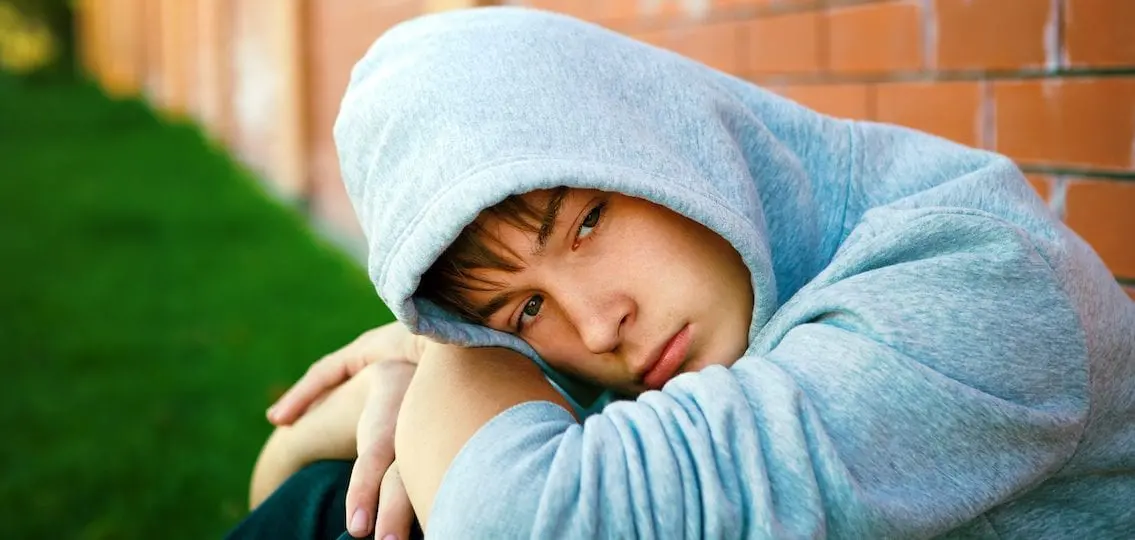As adults, we may think teenagers are old enough to understand divorce better than little kids—and they often are. But that doesn’t make it easy for them. Read on for one teen’s honest account of his feelings about his parents’ divorce, and for expert advice on how to help a teenager through the pain of divorce that is an unavoidable part of this significant family transition.
Teen | Aidan Kohn-Murphy
When I was 14, my parents told me they were getting divorced. This had come after months of disputes while I held onto a blissful ignorance.
At the time, it seemed as if this was the end of my life, that I would never be happy again. As they were telling me, I got up, put on headphones, and walked three miles to a friend’s house. Although I knew that my family life hadn’t been the most loving space as of late, it was the only space I had ever known, and it felt like my world was smashing into millions of pieces and all I could do was watch.
I felt an emotion that I had only felt a few times in my life. I felt powerless.
No matter how hard I screamed, or how sad I was, I couldn’t change what was happening. The pain of their divorce was overwhelming.
I’m the type of person that loves to make plans and follow them to the letter, and this threw all my plans in the air. In my mind I was telling myself that I was being spoiled and dramatic, repeating the fact that “50% of all marriages end in divorce” and that I should “get over it and move on.” I had been expecting them to tell me this, and I explained to myself that this wasn’t a big deal—but when it actually happened, it hurt worse than I imagined.
One of the worst parts of it was the pity. One day at school, one of my teachers walked up and gave me a hug, telling me that I’d “get through it.” Although it was sweet, I didn’t like thinking that she pitied me.
Luckily, I have a good support system that helped me get through the pain of divorce. It made me a stronger person. But more than that, it helped me recognize that I don’t have to get over something immediately.
I don’t have to suddenly be happy again. I can take my time. My daily life can have ups and downs.
This experience taught me that I don’t need to feel one solitary emotion. Life taught me pain and love and how those two aren’t mutually exclusive. Without pain and love, we wouldn’t truly be alive. As I told myself over and over again, “Hey, that’s life.” And life is complexly beautiful.
Expert | Emily Edlynn
Aidan’s response to his parents’ divorce beautifully captures the pain of divorce that many children and teenagers go through emotionally and often have a hard time describing. Even in situations where the child is mature enough to logically understand that their parents are happier no longer married, children deeply feel a sense of loss.
Emotions That Divorce Triggers in Teens:
1. Grief
The parents could handle the divorce in the most sensitive, conflict-free way possible, and their children will go through a grieving process for the family they once had, as far from perfect as it may have been.
It can be helpful to see a divorce as triggering grief. Divorce marks a big change in what a child has known as “home” and “family.” The unknown of how their “home” and “family” will look in the future is scary, and this uncertainty may increase overall worry and anxiety.
2. Guilt
Children also bear an illogical burden of responsibility, again regardless of the facts. Because of their developmentally normal tendency to be self-centered, they often feel they are somehow to blame. They may imagine that if they only behaved better, it would bring their parents back together; on the other hand, they may punish themselves for being at fault, which could look like acting out behaviors.
3. Reticence
Children and teens often keep their thoughts and feelings private so as not to add stress to their parents. This comes from a place of love and protection, but can end up being harmful and put them at risk for depression, anxiety, or behavior problems.
Strategies to Help Teens Manage the Pain of Divorce:
1. Communicate
To lower these risks, open and ongoing communication with both parents can help children to work through these irrational thoughts and tough emotions. The extra support of a family therapist, or child therapist with experience in divorce, could also be invaluable in giving the child a place to express what they fear might hurt their parents.
2. Find Support
Getting to know other children who have gone through divorce also adds a layer of emotional support. Some schools offer groups led by social workers for children going through a challenging life transition, and this could be a great resource. Of course, it’s helpful for teachers to know if a child is going through a divorce so they can understand and communicate with parents if they notice the child appearing distracted, irritable, withdrawn, or just different from usual.

As Aidan’s essay reminds us, children have incredible resilience. With time and these layers of support, they often adjust well to their new normal of home and family, and everyone ends up better off in the long run.
Emily Edlynn, Ph.D., is a clinical psychologist specializing in children and adolescents, as well as the author of the Art and Science of Mom blog and website. You can find her at emilyedlynnphd.com.




